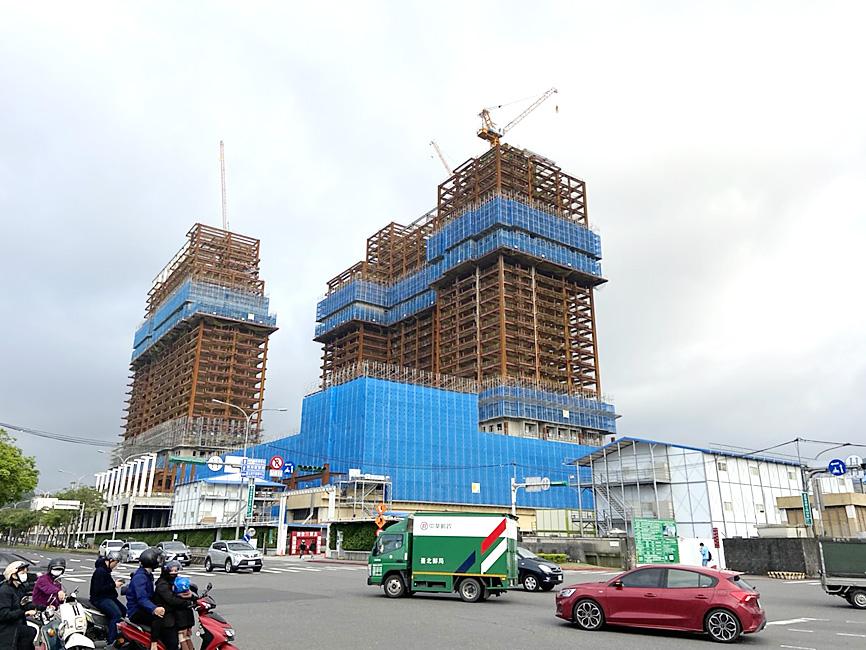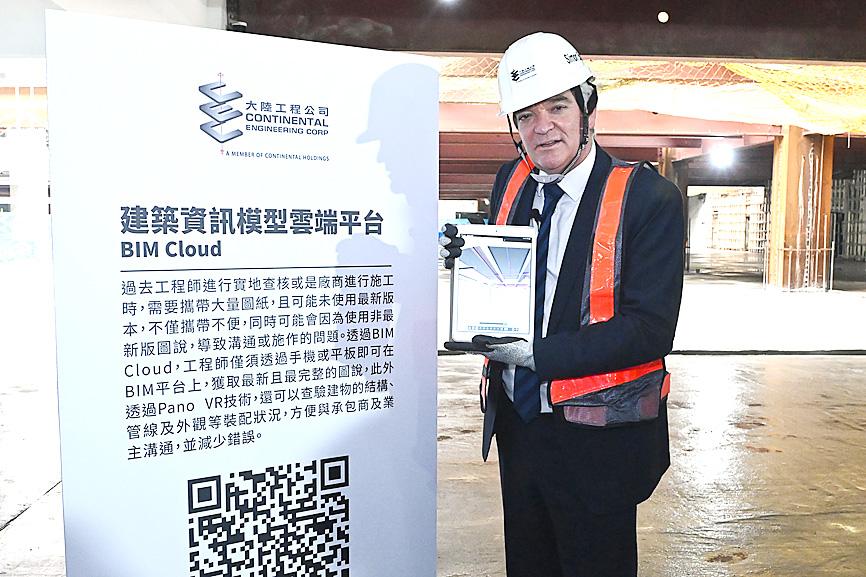Continental Engineering Corp (CEC, 大陸工程) yesterday showcased its technological applications at the construction site of a public housing project in Taipei’s Nangang District (南港).
The company has introduced immersive virtual reality (VR) and Web-based site management applications, and artificial intelligence-based electronic fencing to boost productivity at construction sites, Continental CEO Simon Buttery told a media briefing.
The demonstration was also to mark the 75th anniversary of the firm’s founding, he added.

Photo: Hsu Yi-ping, Taipei Times
The engineering and construction sector, which employs an increasingly aging workforce, is lagging behind in terms of technological migration, Buttery said.
As of last year, the company had a backlog of NT$66.5 billion (US$2.32 billion) in its business in Taiwan, equivalent to 3.5 years of revenue, company data showed.
Construction at the project in Nangang started in late 2019 and would be completed ahead of schedule, in 2025, thanks to the use of new technology, the company said.

Photo courtesy of Continental Engineering Corp
The project, featuring two 27-floor buildings, is to have more than 1,400 apartments with one to three bedrooms, Continental said.
It is near the Nangang Depot of Taipei’s MRT metropolitan railway system, and offices of the depot would occupy the lower floors, it said.
Continental was the first civil engineering company in Taiwan to introduce building information management systems to harness data and add value to buildings after they are finished, with more than half of them being equipped with such systems, Buttery said.
The firm reported NT$14.07 billion in consolidated revenue for last year.
Its parent company, Continental Holdings Corp (欣陸投控), reported NT$1.54 billion in net profit last year, the second-highest profit in the company’s history.
Continental Holdings plans to distribute a cash dividend of NT$1.4 per share based on last year’s earnings per share of NT$1.87, with a payout ratio of 74.87 percent, it has said.
The dividend is pending shareholders’ approval.

Intel Corp chief executive officer Lip-Bu Tan (陳立武) is expected to meet with Taiwanese suppliers next month in conjunction with the opening of the Computex Taipei trade show, supply chain sources said on Monday. The visit, the first for Tan to Taiwan since assuming his new post last month, would be aimed at enhancing Intel’s ties with suppliers in Taiwan as he attempts to help turn around the struggling US chipmaker, the sources said. Tan is to hold a banquet to celebrate Intel’s 40-year presence in Taiwan before Computex opens on May 20 and invite dozens of Taiwanese suppliers to exchange views

Application-specific integrated circuit designer Faraday Technology Corp (智原) yesterday said that although revenue this quarter would decline 30 percent from last quarter, it retained its full-year forecast of revenue growth of 100 percent. The company attributed the quarterly drop to a slowdown in customers’ production of chips using Faraday’s advanced packaging technology. The company is still confident about its revenue growth this year, given its strong “design-win” — or the projects it won to help customers design their chips, Faraday president Steve Wang (王國雍) told an online earnings conference. “The design-win this year is better than we expected. We believe we will win

Chizuko Kimura has become the first female sushi chef in the world to win a Michelin star, fulfilling a promise she made to her dying husband to continue his legacy. The 54-year-old Japanese chef regained the Michelin star her late husband, Shunei Kimura, won three years ago for their Sushi Shunei restaurant in Paris. For Shunei Kimura, the star was a dream come true. However, the joy was short-lived. He died from cancer just three months later in June 2022. He was 65. The following year, the restaurant in the heart of Montmartre lost its star rating. Chizuko Kimura insisted that the new star is still down

While China’s leaders use their economic and political might to fight US President Donald Trump’s trade war “to the end,” its army of social media soldiers are embarking on a more humorous campaign online. Trump’s tariff blitz has seen Washington and Beijing impose eye-watering duties on imports from the other, fanning a standoff between the economic superpowers that has sparked global recession fears and sent markets into a tailspin. Trump says his policy is a response to years of being “ripped off” by other countries and aims to bring manufacturing to the US, forcing companies to employ US workers. However, China’s online warriors